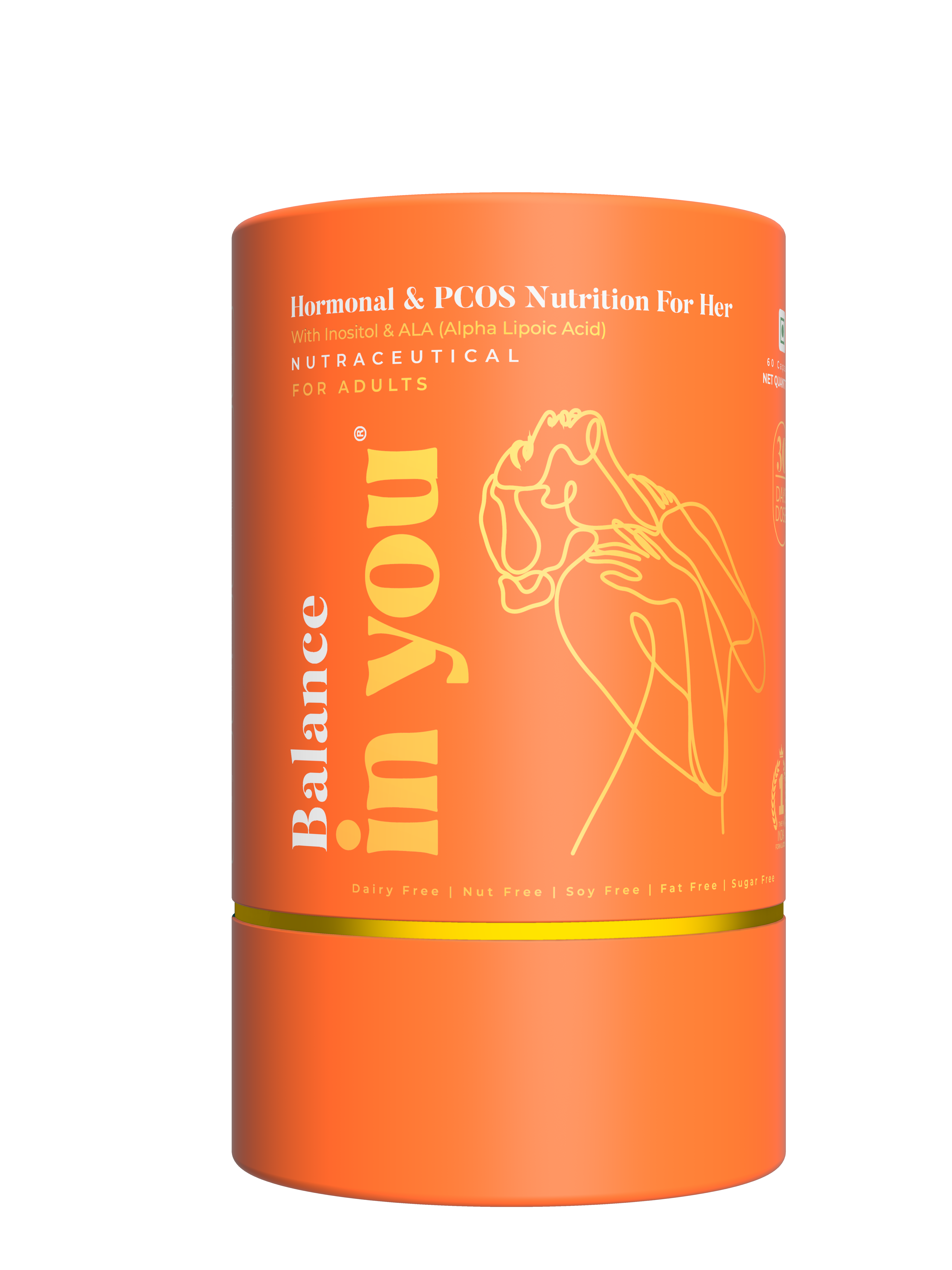- products
- Science
- wellness journal
- About Us
- Faqs
- Sustainability
- Contact Us
- Self Test
- English

Imagine waking up daily feeling like something’s not quite right with your body. You’re tired, moody, and dealing with symptoms you can’t quite pinpoint. This scenario is all too familiar for many individuals who suffer from hormonal problems. Hormonal problems can be frustrating, especially when they affect your period, mood, or even sex drive. Among these, Polycystic Ovary Syndrome (PCOS) stands out as a common and often misunderstood condition. PCOS affects an estimated 8–13% of reproductive-aged women (Source: World Health Organization, 2023). It’s a common hormonal issue that can cause irregular periods, unwanted hair growth, and even challenges with getting pregnant. PCOS can also be the culprit behind your low sex drive as well. If you’re experiencing these symptoms, you might be wondering what’s going on inside your body and what can you do about it.
The good news is that, you are not the only one suffering from the hormonal fluctuations. At InYou, we believe that knowledge is power. This section is designed to be your partner in understanding hormonal problems, particularly PCOS. Let’s get started, shall we?
What are Hormonal Problems and PCOS?
Hormonal imbalances occur when there’s too much or too little hormone in the bloodstream. Hormones play an important role in controlling most major bodily functions, so even a slight imbalance can cause widespread health issues. PCOS is a specific hormonal disorder where the ovaries make more “male hormones” (androgens) than usual. These are hormones that women naturally have in small amounts. Because of this hormone imbalance, two things can happen:
1. Irregular periods: Your ovaries might not release eggs regularly, which can mess up your cycle.
2. Small cysts on the ovaries: These are tiny fluid-filled sacs, but not everyone with PCOS gets them (and some women without PCOS can have them too).
What Causes PCOS?
PCOS can feel like a bit of an enigma, and doctors are still piecing together the exact cause. However, some leading factors seem to be at play. Many women with PCOS have insulin resistance, meaning their bodies doesn’t use insulin effectively. This results in increased insulin levels, which can lead to an increase in androgen levels, worsening PCOS symptoms. Additionally, obesity can elevate insulin levels and worsen the condition.
PCOS also tends to run in families. If your mother or sister has PCOS, you’re more likely to have it too (Source: John Hopkins Medicine). Understanding these contributing factors can help manage and mitigate the impact of PCOS on your life.
1. Missed or irregular periods or very light periods.
2. Enlarged ovaries or multiple ovarian cysts.
3. Excess body hair, particularly on the chest, stomach, and back (hirsutism)
4. Weight gain, especially around the abdomen
5. Acne or oily skin
6. Male-pattern baldness or thinning hair
7. Difficulty getting pregnant (infertility)
8. Small skin tags on the neck or armpits
9. Dark patches on the back of the neck, armpits, and under the breasts
These symptoms can significantly differ from person to person, making PCOS a complex condition to diagnose and manage. Consult a doctor if you have any of these symptoms.
Understanding the Potential Impact of PCOS
While PCOS itself isn’t life-threatening, it can sometimes increase your risk of developing specific health concerns down the line. Here’s a breakdown of some potential complications:
1. Type 2 Diabetes: The insulin resistance linked to PCOS can complicate blood sugar regulation, heightening the risk of type 2 diabetes.
2. Fertility Challenges: Due to irregular ovulation, PCOS can make it harder to conceive.
3. High Blood Pressure and Heart Issues: Women with PCOS may face an elevated risk of hypertension and heart-related problems.
4. Uterine Cancer: Although rare, there is a slightly increased risk of uterine lining cancer in women with PCOS.
The Complex Relationship Between Weight Gain and PCOS
Picture PCOS and weight gain as two roommates who make things challenging for each other. Insulin resistance, an everyday PCOS buddy, can lead to weight gain, especially around your belly. This extra weight can then make insulin resistance even worse – kind of like a bad roommate who keeps leaving dirty dishes everywhere! On top of that, the hormone imbalances in PCOS can make weight loss a real challenge. High androgen levels can lead to your body storing more fat and burning less energy, making it harder to shed those extra pounds.
The key takeaway here is that while losing weight can improve PCOS symptoms, PCOS itself can make weight management tricky. A healthy diet, regular exercise, and sometimes even some medical help might be your best bet to break this cycle. Remember, it’s not about quick fixes but finding a balanced approach that works for you in the long run!
Dealing with PCOS: How to Feel Your Best
All right, we now understand what PCOS is and why it might happen. Now, you’re probably wondering, “How do I get this under control?” Unfortunately, there is no permanent cure for PCOS. But the good news is there are ways to manage PCOS, and it feels fantastic!
The best approach depends on a few things, like your age, symptoms, and if you’re planning a pregnancy. Here’s a breakdown:
Planning for pregnancy?
1. Diet and exercise: Think “power couple” for PCOS. Eating healthy and getting active can help you lose weight, improve insulin sensitivity, and even regulate ovulation.
2. Ovulation boosters: Medications can help your ovaries release eggs regularly. Remember, these come with a few things to consider, like a slightly higher chance of multiples and a condition called ovarian hyperstimulation (unpleasant bloating and pelvic pain). We’ll discuss these details further down the line.
Not Planning for pregnancy?
1. Birth control pills: These can be your BFFs, regulating your cycle, lowering those “male hormones,” and even tackling acne.
2. Taming insulin resistance: Certain medications used for diabetes can help your body use insulin better, potentially reducing “male hormones,” slowing hair growth, and even regulating ovulation.
3. Diet and exercise: Our superstar duo strikes again! Just like for those planning pregnancy, healthy habits can significantly improve PCOS symptoms.
4. Spot treatments: Want to tackle specific concerns like unwanted hair growth or acne? Some medications can help with that, too!
A holistic approach to wellness is essential. This means addressing the physical symptoms and taking care of your mental and emotional well-being. Support groups, counselling, and stress management techniques can all help you feel your best.
Conclusion
Dealing with hormonal imbalances and PCOS can be challenging, but it’s important to remember that you’re not inferior or alone in this journey. These conditions are manageable, and with the right approach, you can live a healthy and fulfilling life. At InYou, we believe in a holistic approach to wellness, which helps you understand your body, dispel myths, and embrace a healthier lifestyle. Remember, this is not just about treating symptoms; it’s about empowering you to take control of your health and well-being. It’s about the journey from illness to wellness!
Disclaimer: This information is for educational purposes only and should not be substituted for professional medical advice. Always consult with a healthcare provider to discuss your situation and get the best treatment.
Author:
Source:


Embrace your body, ignite intimacy, and unlock boundless pleasure.
Related Products

Get 15% off
on your first order
You’ll also get dibs and a heads up on any sales or product launches.








